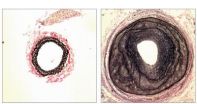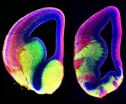(Press-News.org) Many observational epidemiologic studies have found an inverse association between alcohol consumption and hematological cancers (such as lymphoma and leukemia). This study, based on the Million Women's Study in the UK, is large enough to permit an evaluation of associations with various types of such cancers. Further, it takes into account newer coding systems for morphology so that diseases associated with the lymphatic system can be separated from those of the myeloid system.
The key findings are that alcohol consumption appears to lower the risk of several types of lymphoma and plasma cell neoplasms, but has little effect on the risk of myeloid tumours such as acute myeloid leukaemia. Smoking is associated with an increase in risk for most such cancers. Approximately 1.3 million middle-aged women were recruited in the United Kingdom during 1996 and followed for death, emigration and cancer registration until 2009 (mean 10.3 years per woman); potential risk factors were assessed by questionnaire. Adjusted relative risks were estimated by Cox regression.
During follow-up, 9,162 incident cases of haematological malignancy were recorded, including 7,047 lymphoid and 2,072 myeloid cancers. Among predominantly moderate alcohol drinkers, higher intake was associated with lower risk of lymphoid malignancies, in particular diffuse large B-cell lymphoma [relative risk 0.85 per 10 g alcohol per day (95% confidence interval 0.75.96)], follicular lymphoma [0.86 (0.76.98)] and plasma cell neoplasms [0.86 (0.77.96)]. Among never- and current smokers, higher cigarette consumption was associated with increased risk of Hodgkin lymphoma [1.45 per 10 cigarettes per day (1.22.72)], mature T-cell malignancies [1.38 (1.10.73)] and myeloproliferative/myelodysplastic disease [1.42 (1.31.55)].
Forum reviewers considered this to be a very well-done analysis, and the ability of the authors to separate the effects on lymphoid and myeloid cancers is important. Forum members emphasize the strong differences in effect of smoking (an increase) and alcohol consumption (a decrease) on the risk of these cancers. They support future research to discover the mechanisms by which moderate drinking may lower such risk.
###
Reference: Kroll ME, Murphy F, Pirie K, Reeves GK, Green J, Beral V, for the Million Women Study Collaborators. Alcohol drinking, tobacco smoking and subtypes of haematological malignancy in the UK Million Women Study. British Journal of Cancer 2012;107:879.
Comments for this review were provided by the following members of the International Scientific Forum on Alcohol Research:
Harvey Finkel, MD, Hematology/Oncology, Boston University Medical Center, Boston, MA, USA
Arne Svilaas, MD, PhD, general practice and lipidology, Oslo University Hospital, Oslo, Norway
Andrew L. Waterhouse, PhD, Department of Viticulture and Enology, University of California, Davis; Davis, CA, USA
Erik Skovenborg, MD, Scandinavian Medical Alcohol Board, Practitioner, Aarhus, Denmark
Giovanni de Gaetano, MD, PhD, Research Laboratories, Catholic University, Campobasso, Italy
Dominique Lanzmann-Petithory,MD, PhD, Nutrition/Cardiology, Praticien Hospitalier Hôpital Emile Roux, Paris, France
R. Curtis Ellison, MD, Section of Preventive Medicine & Epidemiology, Boston University School of Medicine, Boston, MA, USA
Effects of alcohol on lymphoma, leukemia, and other types of hematological cancers
2012-11-13
ELSE PRESS RELEASES FROM THIS DATE:
G proteins regulate remodelling of blood vessels
2012-11-13
This press release is available in German.
Blood vessels are extremely dynamic: depending on the external conditions, they can adapt their permeability for nutrients, their contractility, and even their shape. Unlike cardiac muscle cells, for example, the smooth muscle cells in blood vessels demonstrate a high degree of plasticity, so they can specialise or multiply as required, even repairing damage to the vessel wall. This vascular remodelling is evidently precisely regulated. Disruptions are extremely significant in conditions such as atherosclerosis or high blood ...
It pays to cooperate
2012-11-13
CAMBRIDGE, MA - Many species exhibit cooperative survival strategies — for example, sharing food or alerting other individuals when a predator is nearby. However, there are almost always freeloaders in the population who will take advantage of cooperators. This can be seen even among microbes such as yeast, where "cheaters" consume food produced by their neighbors without contributing any of their own.
In light of this, evolutionary biologists have long wondered why cooperation remains a viable survival strategy, since there will always be others who cheat. Now, MIT physicists ...
How online video stream quality affects viewer behavior
2012-11-13
AMHERST, Mass. – It may seem like common sense that the quality of online video streaming affects how willing viewers are to watch videos at a website. But until computer science researcher Ramesh Sitaraman at the University of Massachusetts Amherst and collaborators at Akamai developed a way to rigorously study the question, no one had been able to scientifically test the assumption.
They conducted the first large-scale study of its kind to quantitatively demonstrate how video stream quality causes changes in viewer behavior. "Video stream quality is a very big topic ...
Once the conflict is over, solidarity in alliances goes out of the window
2012-11-13
This press release is available in German.
It is not always wise to form an alliance while in a conflict or at war, especially when there is something to be shared afterward. Economists from the Max Planck Institute for Tax Law and Public Finance have now shown by game theory experiments that, as soon as the enemy is gone, in-group solidarity of alliances vanishes rapidly. Former brothers in arms fight even more vigorously over the spoils of a victory than strangers do. During the conflict, they expend together only half the effort of their enemy. Furthermore, when ...
Watching the developing brain, scientists glean clues on neurological disorder
2012-11-13
CHAPEL HILL, N.C. – As the brain develops, each neuron must find its way to precisely the right spot to weave the intricate network of links the brain needs to function. Like the wiring in a computer, a few misplaced connections can throw off functioning for an entire segment of the brain.
A new study by researchers at the University of North Carolina School of Medicine reveals how some nerve cells, called interneurons, navigate during the development of the cerebral cortex. Mutations in a key gene behind this navigation system underlie a rare neurological disorder called ...
Glutamate neurotransmission system may be involved with depression risk
2012-11-13
Researchers using a new approach to identifying genes associated with depression have found that variants in a group of genes involved in transmission of signals by the neurotransmitter glutamate appear to increase the risk of depression. The report published in the journal Translational Psychiatry suggests that drugs targeting the glutamate system may help improve the limited success of treatment with current antidepressant drugs.
"Instead of looking at DNA variations one at a time, we looked at grouping of genes in the same biological pathways and found that a set ...
Baiting mosquitoes with knowledge and proven insecticides
2012-11-13
This press release is available in Spanish.
While one team of U.S. Department of Agriculture (USDA) scientists is testing the effectiveness of pesticides against mosquitoes, another group is learning how repellents work.
At the Agricultural Research Service (ARS) Center for Medical, Agricultural and Veterinary Entomology (CMAVE) in Gainesville, Fla., entomologist Sandra Allan is using toxic sugar-based baits to lure and kill mosquitoes. Allan and her CMAVE cooperators are evaluating insecticides and designing innovative technology to fight biting insects and arthropods. ...
Annals of Internal Medicine tip sheet for Nov. 13, 2012
2012-11-13
1. Prophylactic Probiotics Reduce Clostridium difficile-associated Diarrhea in Patients Taking Antibiotics
Prophylactic use of probiotics can reduce Clostridium difficile-associated diarrhea (CDAD). Clostridium difficile is a bacterium that can cause symptoms ranging from diarrhea to life-threatening inflammation of the colon. CDAD most commonly affects older adults in hospitals or in long term care facilities and typically occurs after use of antibiotics. Probiotics are microorganisms thought to counteract disturbances in intestinal flora, and thereby reduce the risk ...
November/December 2012 Annals of Family Medicine tip sheet
2012-11-13
52,000 More Primary Care Physicians Needed by 2025 to Meet Anticipated Demand
Researchers project the United States will need 52,000 additional primary care physicians by 2025 — a 25 percent increase in the current workforce — to address the expected increases in demand due to population growth, aging, and insurance expansion following passage of the Affordable Care Act. Analyzing nationally representative data, the researchers conclude population growth will be the single greatest driver of increased primary care utilization, requiring approximately 33,000 additional ...
Head injury + pesticide exposure = Triple the risk of Parkinson's disease
2012-11-13
MINNEAPOLIS – A new study shows that people who have had a head injury and have lived or worked near areas where the pesticide paraquat was used may be three times more likely to develop Parkinson's disease. The study is published in the November 13, 2012, print issue of Neurology®, the medical journal of the American Academy of Neurology. Paraquat is a herbicide commonly used on crops to control weeds. It can be deadly to humans and animals.
"While each of these two factors is associated with an increased risk of Parkinson's on their own, the combination is associated ...


